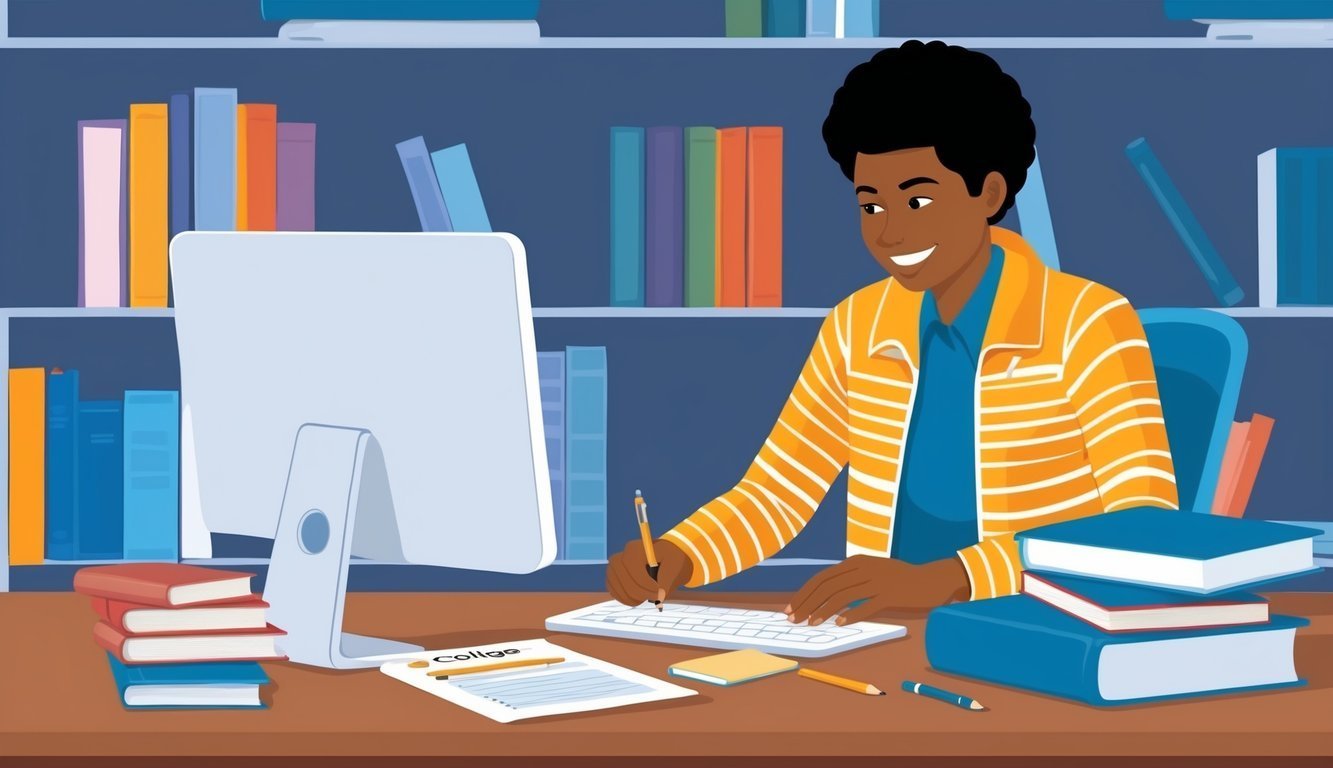Thinking about college? You’re definitely not alone.
Every year, millions of students dive into the college application scene across the U.S. and beyond.
It’s a thrilling time, but I know it can feel a bit like juggling flaming torches.
But don’t sweat it—we’ve got your back!
The college application process typically means gathering documents, taking tests, writing those dreaded essays, and reaching out for recommendation letters. Sure, it sounds like a lot, but breaking it down into bite-sized pieces can make it easier.
And guess what? There’s a whole universe of resources to help you!
Ready to kick off your college adventure? Let’s jump into the essentials of getting into college and check out some handy tips to keep things smooth sailing.
Whether you’re eyeing a quaint liberal arts school or a bustling state university, these pointers will help you shine.
Start by researching colleges that match your academic ambitions and personal vibes—every school has its own unique offerings and campus feel.
Plus, think about how your college journey might loop in other paths, like joining the military, if you’re curious about a career in service alongside your studies.
Staying organized and keeping a close eye on deadlines is key as you navigate your way through applications, financial aid, and the enrollment maze.
Key Takeaways
- Get your documents together and tackle those standardized tests as early as you can
- Writing a stellar personal essay and securing solid recommendation letters is crucial
- Consider using online platforms like Common App to simplify applying to multiple colleges
Getting Ready to Apply
Preparing your college applications means tackling a few key steps: gathering your requirements, taking those important tests, and seeking out financial aid.
Here’s the scoop on getting started.
Understanding the Application Requirements
Different colleges have different requirements when you apply.
Most want to see your high school transcript and your test scores.
They also look for essays and letters that highlight your strengths.
The Common App is a lifesaver—it lets you fill out one application for over 1,000 colleges.
Make a checklist of what each school requires.
This will keep you on top of your game! Some may ask for additional items like interviews or portfolios.
And don’t forget to stay on top of those deadlines! They vary from school to school, so pop them on your calendar.
Registering for Standardized Tests
Most colleges will want to see your SAT or ACT scores.
These tests give them a good idea of how ready you are for college-level work.
It’s crucial to prepare, as your scores can make a difference in admissions decisions.
If you’re not sure how to sign up for the SAT, head over to the official College Board website for all the info you need.
Sign up early for these tests, and don’t worry—if you don’t ace it the first time, you can take it again to improve your scores.
Just be sure you leave some time before those college deadlines.
Some colleges also like to see AP exam scores, which can often count for college credit.
Study guides and practice tests can give you the edge you need.
Many are free online! If you need some extra help, consider taking a class or hiring a tutor.
Asking for Recommendation Letters
Your teachers and counselors are crucial allies—they can write great letters about you! Choose people who really know you and have seen you in action.
Be sure to ask them early—at least a month before you need those letters.
That gives them time to craft something meaningful.
Share your achievements and goals with them.
This info can help them write a stronger letter.
Some schools prefer letters sent directly to them, while others allow you to submit them through the Common App.
Make sure you know each college’s preferences.
Drafting a Personal Essay
Your essay is a golden opportunity to showcase who you are beyond grades and test scores.
Most colleges provide essay prompts to help you get started.
Begin by brainstorming ideas—what makes you tick? What’s your story?
Write a first draft without stressing about perfection.
Afterward, you can edit it for clarity and spice.
Ask teachers or family to read it and offer feedback; a fresh pair of eyes can spot things you might miss.
Just remember to hit that word count—most colleges look for essays around 500-650 words.
Exploring Financial Aid and Scholarships
College can definitely pinch your wallet, but there’s help out there.
Start by filling out the FAFSA (Free Application for Federal Student Aid).
It’s a key step in securing financial aid.
Also, look for scholarships! There’s a treasure trove of options for various skills, backgrounds, and interests.
Your school counselor can be a great resource for finding these.
Many colleges offer their own scholarships too, so check their websites or speak with their financial aid offices.
Don’t let costs scare you away from applying to a school you love—lots of colleges have financial aid to help students afford their dreams.
Submitting Your Application
Sending in your college applications can feel like a monumental task, but with a little planning, you can make it happen smoothly.
Here’s what you need to know about submitting your applications.
Navigating Application Platforms
Many colleges use online platforms for their applications.
The Common App shines here—it lets you apply to lots of schools with one application.
You create an account, fill in your details, and voilà, you’re ready to send it off to multiple colleges.
And let’s not forget, signing up for dual enrollment can also boost your academic profile by letting you take college-level courses while still in high school.
Talk about a win-win!
Some schools might have their own application websites that ask for slightly different items than the Common App, so be sure to check the specific requirements for each institution.
Don’t skip the activities section.
This is your chance to flaunt your hobbies and clubs—an important piece of your application puzzle.
Finalizing Your Application Materials
Before you hit that submit button, take a deep breath and double-check everything.
Make sure your essays shine by checking for grammar and spelling errors.
It’s also a smart move to have someone else look them over for you.
Your transcripts are crucial, so ask your school to send them to colleges early to avoid last-minute stress.
And don’t forget about those test scores—check each school’s testing requirements carefully.
Understanding Deadlines and Admission Plans
Colleges typically have various types of deadlines.
Early Decision means you’re applying early and you’re committed if you’re accepted.
Early Action is also early, but you don’t have to make that commitment right away.
Regular Decision is pretty standard, and some schools operate on Rolling Admissions, meaning they review applications as they come in.
Make a handy list of all your deadlines and keep it on your calendar to stay organized and ensure you don’t miss any important dates!
Sending Your Applications
When you’re ready to submit, relax and take that leap of faith.
Click the submit button for each school, but don’t forget about potential application fees.
If that’s a hurdle for you, don’t hesitate to ask about fee waivers!
Once submitted, keep an eye on your email.
Schools may reach out for additional information or let you know they’ve received your application.
Good luck with your college journey—it’s an exciting ride!
Frequently Asked Questions

Getting into college involves several key steps and documents.
The process can vary whether you’re a high school student or a returning adult.
Plus, there are options if you think you might have missed some application deadlines.
What are the steps to getting into college?
The first step? Making a solid college list.
Think about what you want in a school—size, location, programs, you name it.
Be prepared to tackle standardized tests like the SAT or ACT, as many colleges require these scores.
Then, fill out your applications for each college.
Don’t forget those essays and letters of recommendation!
What documents do I need to apply for college?
You’ll definitely need your high school transcripts, showing your grades and classes.
Most schools also require standardized test scores, whether they’re from the SAT or ACT.
Letters of recommendation from teachers or counselors are common too.
Some schools may even ask for a resume of your activities.
How do I enroll in college for the first time?
Once you’re accepted, confirm your spot at the school by submitting a deposit.
Simple, right?
Don’t forget to sign up for orientation; it’s a fantastic way to get acquainted with the campus and register for classes.
Make sure to submit your health records and proof of immunizations, and set up your student email and account for course registration.
How to apply for college after high school?
The process is pretty similar to applying straight out of high school.
You’ll still need transcripts and test scores.
Be ready to share what you’ve been up to since graduation, especially if there are any gaps in your education.
And think about writing an essay about your experiences since high school; it can give your application that extra sparkle.
How to start college as an adult?
Many colleges have programs for adult learners.
Search for schools offering evening or online classes that fit into your life.
You might still need to take placement tests to figure out where to begin.
Some schools even grant credit for work experience—make sure to inquire about that during your application!
Is it too late to apply for college?
It’s hardly ever too late! Many schools offer rolling admissions or late deadlines.
Community colleges often welcome applications right up until classes kick off.
If you missed the boat for four-year schools, this is a great alternative.
Don’t forget, some four-year colleges have early decision and early action options, but regular deadlines usually pop up in the winter or spring.

